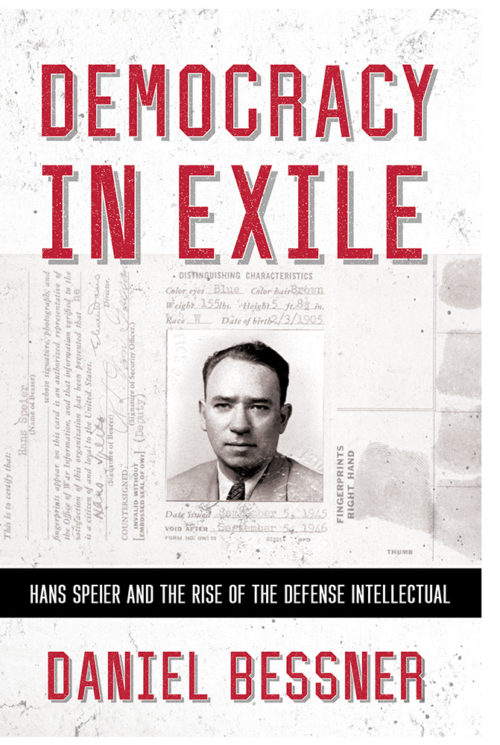The Book
Democracy in Exile: Hans Speier and the Rise of the Defense Intellectual
The Author(s)
Daniel Bessner
Editor's Note
This week, the Society of U.S. Intellectual Historians is pleased to present a roundtable discussion of Daniel Bessner’s Democracy in Exile: Hans Speier and the Rise of the Defense Intellectual. Check this space from today through Friday for additional entries in the roundtable discussion.

It is my pleasure to introduce this roundtable on Daniel Bessner’s Democracy in Exile: Hans Speier and the Rise of the Defense Intellectual. Over the last several years, an increasing number of books have straddled two fields that previously had little to do with one another: U.S. intellectual history and the history of U.S. and the World. Anyone looking at the latest catalogues of academic presses or the schedules for recent meetings of The Society for Historians of American Foreign Relations (SHAFR) or the Society for U.S. Intellectual History (S-USIH) cannot avoid seeing a burgeoning scholarship standing at the confluence of these two fields. Some of the best works in this area are from younger scholars, who have been shaped by the broadening horizons of the U.S. and the World—encompassing the cultural turn, transnational history, and international history—and the increasing interest among intellectual historians in political and transnational history. It is one of my hopes for this roundtable to draw attention to the methodology of this new scholarship and to bring recognition to what is becoming a distinct field of study.
Daniel Bessner’s Democracy in Exile stands out in this growing field. His book is more than a biography of Hans Speier, a German émigré who became an influential defense intellectual in Cold War America. As Cornell Press puts it:
Democracy in Exile places Speier at the center of the influential and fascinating transatlantic network of policymakers, many of them German émigrés, who struggled with the tension between elite expertise and democratic politics. Speier was one of the most prominent intellectuals among this cohort, and Bessner traces his career, in which he advanced from university intellectual to state expert, holding a key position at the RAND Corporation and serving as a powerful consultant to the State Department and Ford Foundation, across the mid-twentieth century. Bessner depicts the critical role Speier played in the shift in American intellectual history in which hundreds of social scientists left their universities and contributed to the creation of an expert-based approach to U.S. foreign relations, in the process establishing close connections between governmental and nongovernmental organizations. As Bessner writes: to understand the rise of the defense intellectual, we must understand Hans Speier.
Daniel Bessner will be familiar to many. He is the Anne H.H. and Kenneth B. Pyle Assistant Professor in American Foreign Policy in the Henry M. Jackson School of International Studies at the University of Washington. Three reviewers have generously contributed many thoughtful insights and questions about Bessner’s book. They are Jeremi Suri, the Mack Brown Distinguished Chair for Leadership in Global Affairs at the University of Texas at Austin, where he is a Professor in the Department of History and the Lyndon B. Johnson School of Public Affairs; Anne M. Kornhauser, Associate Professor and Chair, Department of History at the City College of New York, and the CUNY Graduate Center; and Thomas Meaney, Visiting Fellow at the Institute for Human Sciences (IWM) in Vienna. My many thanks to all the participants for their thoughtful contributions.
About the Reviewer
Gene Zubovich is a Visiting Fellow at the University of Toronto. He is a scholar of U.S. and the World, human rights, and religion. His most recent work will appear in the July 2018 issue of the Journal of the History of Ideas (“American Protestants and the Era of Anti-racist Human Rights”) and the September 2018 issue of The Journal of American History (“For Human Rights Abroad, against Jim Crow at Home: The Political Mobilization of American Ecumenical Protestants in the World War II Era.”)

0